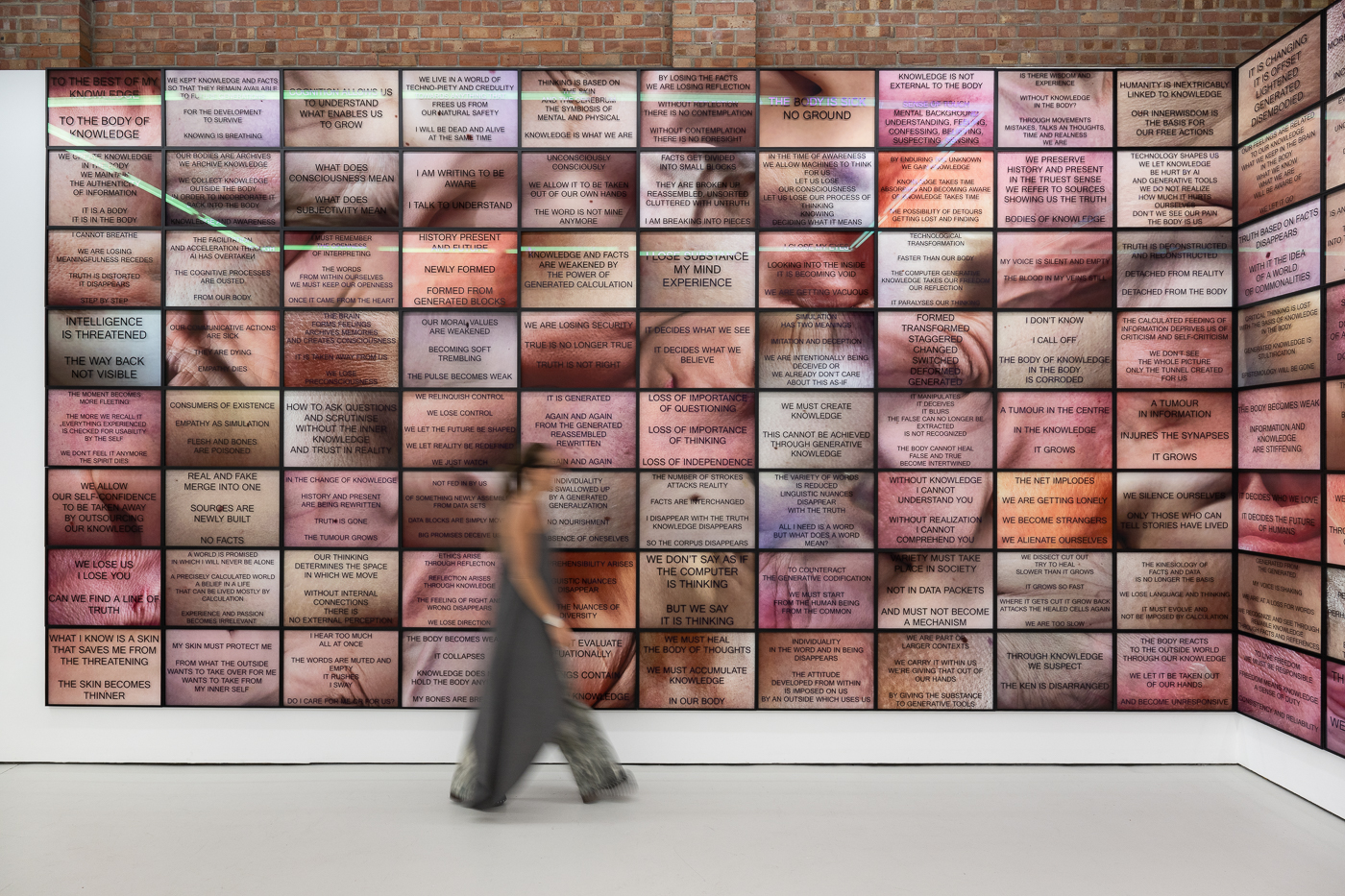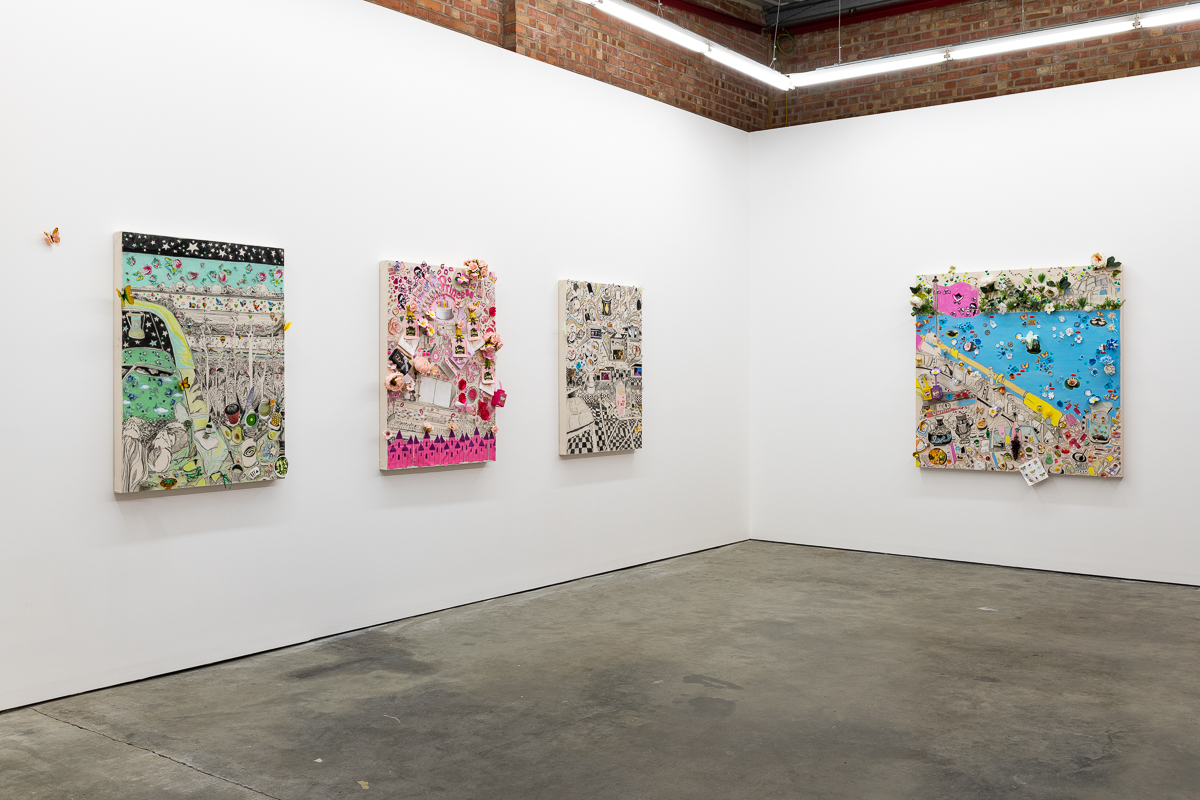Fast Company discusses Gretchen Andrew’s SEO work.
How an ex-Googler turned artist hacked her work to the top of search results
By Steven Melendez
After seeing casual sexism at work in Silicon Valley, Gretchen Andrew turned away from her tech career to pursue a career in art, apprenticing with the prolific British artist Billy Childish. Her art has come to meld her high-tech background with traditional painting. She’s created a series of aspirational, pink glittery “vision boards” with titles such as Cover of Artforum and The Next American President. Her work playfully explores her aspirations for herself and the world. And it’s accompanied by websites that she hacks into the top of Google results for their titles, using the kinds of search engine optimization tricks more typically harnessed by businesses.
Andrew’s most recent gallery exhibition, at London’s Annka Kultys Gallery, invites visitors to explore her physical artwork—and use their own devices to check out the search results that prioritize them.
I spoke to Andrew about her work and what it says about power dynamics in the tech industry, the art world, and the larger implications of search engine manipulation. This interview was edited for length and clarity.
Fast Company: You worked in the tech industry before you began making art. How was that experience and what made you decide to leave?
Gretchen Andrew: I studied information systems. I worked at Intuit through university. And then I got what should have been the most perfect dream job at Google. And I pretty quickly found that the experience of being there wasn’t one in which people were being celebrated for being themselves for being innovative, unless you looked a certain way or fit into a certain mold.
One example that always comes back to me is, I was doing this thing at Google where every morning, I go to a different cafeteria and have lunch with a stranger and talk about what they’re doing. You know, for almost anyone else at the company, this would have been perceived as a great networking, “this is how I made it in my career” kind of move. And I just constantly had those interactions misinterpreted as romantic advances. So I started in the cycle of, okay, I need to dress differently. I’m in my early twenties. I think this is my fault.
So I start not washing my hair. I start wearing a hoodie. I do all these things I think are going to help solve this problem. And then, in one of my official reviews, my manager told me I needed to look more presentable. So I pretty quickly realized that I was playing a losing game, or I was playing somebody else’s game. I wanted to leave and do something in which I would be taken seriously. And even though I knew absolutely nothing about making art or the art world, art was, in my mind, this place where individuality and perspective was championed.
And from the beginning, it seems like your art engaged with internet technology.
“I TAKE THE SYSTEMS AS THEY EXIST AND I INFILTRATE THEM THROUGH INPUT.”
When I left, I decided that the internet would make me into something else that I wasn’t: this thing called an artist. I was upset with what was happening to me personally in Silicon Valley, but I also believed still in the potential of these tools and of these systems. And so my work can really be seen from that time forward as an exploration of using the system that I didn’t feel like was designed for me or for a diversity of people, but making it work for me and acquiring the skills and ways in which it could be appropriated by me and used by me to be taken seriously and to be considered a technology innovator. All of these things that from inside the building didn’t seem possible—the tools could still be used by me in ways that Google didn’t intend.
Some of your art addresses issues in the art world itself. Do you see some of the same biases in the art world that you saw in the tech world?
It’s different. Power is very different. There’s no manager, there’s no boss, and that has implications for how power is experienced. But mostly, I found the art world is much more open than the tech world to be self-critical. And it doesn’t do things perfectly by any stretch of the imagination. But I actually think that awareness is real, that it knows that it’s deeply imperfect. And I don’t know how it is today, but I think even 10 years ago there was still this feeling in Silicon Valley like geeky white men were the underdogs. There was this feeling of like, “Oh, I know what it’s like to be bullied.” They didn’t see themselves as the people wielding the power.
My work is an art practice in large part because I didn’t find a home where it would have been a more traditional career path. I don’t wait for the government to regulate this. I don’t wait for big tech to apologize. I take the systems as they exist and I infiltrate them through input.
I look at the way that search works, the SEO works, the way the SEO impacts artificial intelligence, the way that natural language processing relates to the binary code. And I inject this weird glittery, girlie, feminine thing into it. Creative disruption’s what the tech world uses, but I think of it from the art term of “productive uncertainty.” That when we as people see art, one of the things that I believe happens in our brain is that we become less sure that we see the world in the only way it’s possible of seeing it, and by essentially loading AI with art, we can cause that same productive uncertainty, that same sort of dissonance.
And as you put together these sites, how exactly are you getting them to rank high in the Google results?
I use some metadata. I use HTML. I use alt text. All of the tools of search engine optimization are a huge part of my practice. But the core of it really is language based, where I go onto WordPress and Pinterest and Yelp and SoundCloud, any of these websites that allow you to have a profile and publish text. And I say, “I really, really want the U.K. to be back in the EU. I want to reverse Brexit. I want the map of the EU to include the U.K. still. I want the U.K. to be part of the EU.”
WHAT I DO HAS QUITE DARK IMPLICATIONS.”
I just talk about what I want, and by talking about what I want, I build that relevance. I remix that, and I have some fun with the use of poetic language. But the majority of it happens just by endlessly putting out into the universe of Google and all web content what you want.
I love desire as one of these spaces to play in. Because when I say, I want my work to be on the cover of The New York Times [in an upcoming work] or I want my work to achieve the contemporary art auction record, it’s 100% clear to me that we’re talking about a space of separation [between aspiration and reality]. Google algorithms in general, Facebook, Amazon, all of these companies, all of the code only deals in relevance. And you can build relevance through hope, through fear, through desire, but it all gets collapsed into, “Oh, Gretchen is now relevant to the New York Times cover.”
This collapsing of how’re we related to things is kind of fun and playful. I also really love that to understand desire you have to be human. And to me, that makes desire something we can double down on and celebrate as something that is very different for relevance and will separate us from any code that is built on language and binary [math].
How do you think your work will change if these dreams and desires start to come true?
Well, the dreams have started to come true, which is very exciting. I think the heart of your question, as I understand it is about how as I actually achieve and accumulate more power for myself professionally, how does that change the practice? I still think there’s no artist in the world who’s as powerful as Mark Zuckerberg. There’s no artist in the world who’s as powerful as the American president.
You know, it’s one thing to take over the art world, but I also did a search engine hack of “the next American president” during the election. And either political party would gladly pay me lots of money for me to be working on their team. Instead, I thought it was more interesting to show the brushstrokes of power—to show how power constructs itself online and to be making statements that are about something more long-term and abstract than just any individual presidential election, any individual political activity.
One of the unintended consequences of that hack was that me and my work sort of blew up in India for a couple of weeks. And one of the reasons I think I got so much traction in India is it’s a country where so many people feel under the thumb of big technology. So there’s a lot of people who were now experiencing these things SEO as tools for their own potential power and liberation. I can be in Art Basel all I want, but inspiring people to self-represent online and use a skill set that they thought was in the pocket of big tech for their own authority is something that I don’t think will run out anytime soon, for better and worse.
You refer to yourself and your work as “internet imperialist.” What does that mean to you?
I like to keep the literal surface of my work positive and glittery. I think it’s much easier to make artwork or to have a critical public practice about protesting what the internet’s doing wrong. I think it’s much harder to find potential solutions to that. I guess my potential solution is, we can all hack the inputs. We can appropriate these systems without Congress deciding anything, without getting a job at Google, without any of these things.
What I do has quite dark implications. Like I said, either political party would have loved to have me and my skills working for them in the last campaign. The way I achieve these results is used every day in ways that we don’t see. When we see my art come up at the top of search results, we’re very aware that the system is being tampered with. It looks wrong.
However, when we don’t see those brushstrokes, we don’t see the trail, when we don’t see someone putting themselves forward and being like, “I’m making this work for me,” then it is part of a history of imperialism. It’s part of what’s happening on the internet every day. And without having to dwell in that space and making it much more solution-focused or forward-focused, I want to acknowledge that that’s a definite part of what makes me able to do what I’m doing: that people use this for much more dark and sinister purposes.
Download PDF


